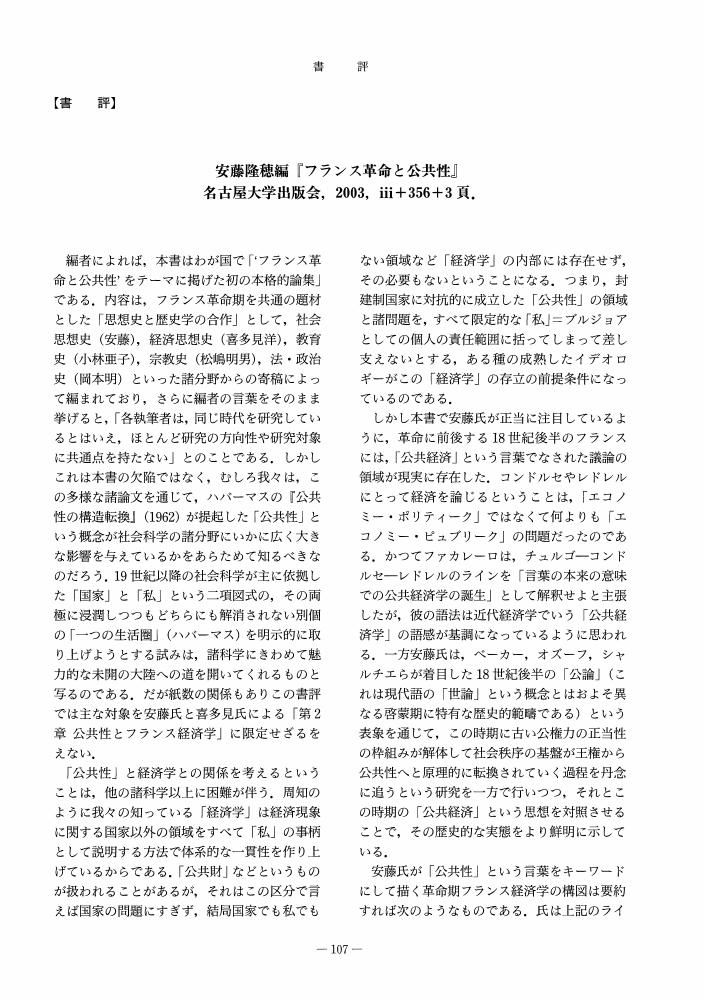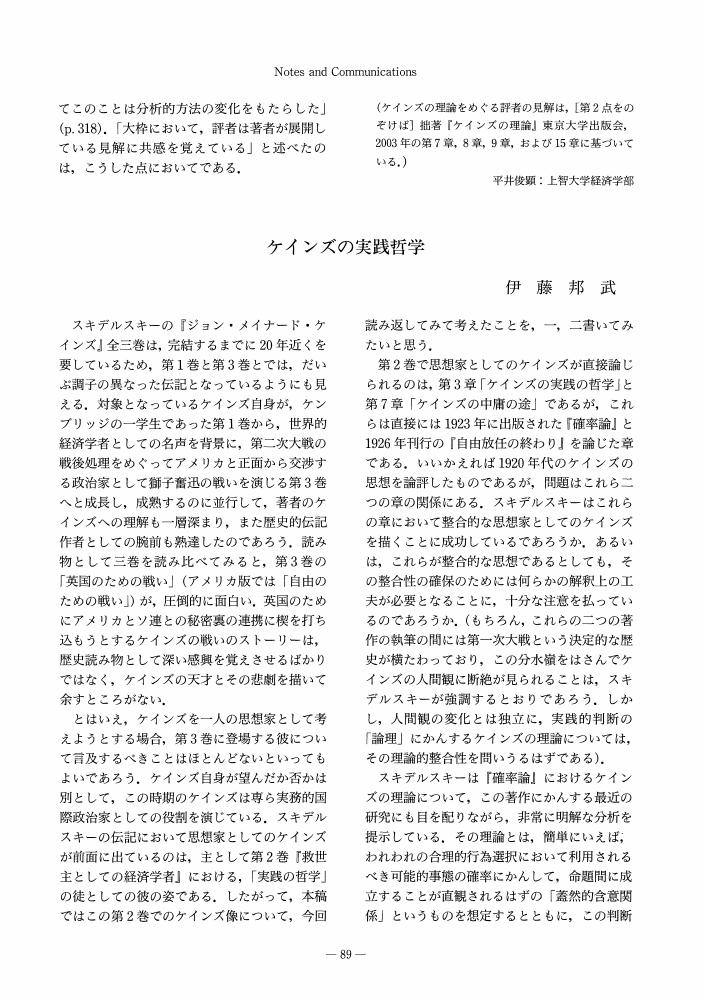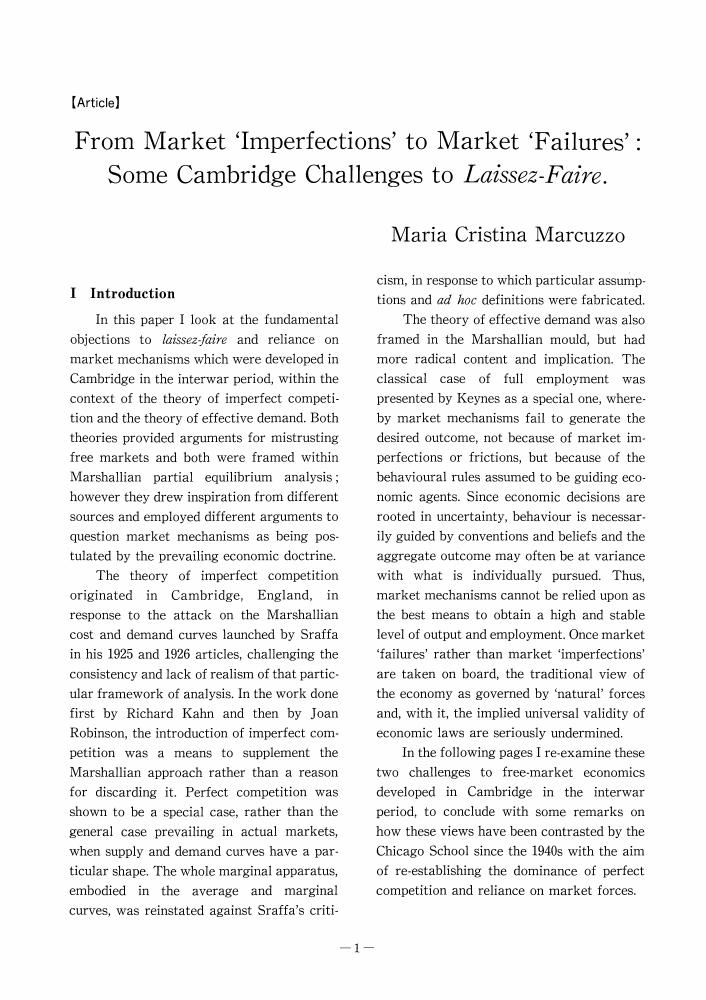1 0 0 0 OA 安藤隆穂編『フランス革命と公共性』名古屋大学出版会, 2003, iii+356+3頁
- 著者
- 岩本 吉弘
- 出版者
- 経済学史学会
- 雑誌
- 経済学史学会年報 (ISSN:04534786)
- 巻号頁・発行日
- vol.45, no.45, pp.107-109, 2004 (Released:2010-08-05)
- 著者
- 高 哲男
- 出版者
- The Japanese Society for the History of Economic Thought
- 雑誌
- 経済学史学会年報 (ISSN:04534786)
- 巻号頁・発行日
- vol.45, no.45, pp.120-121, 2004 (Released:2010-08-05)
- 著者
- 只腰 親和
- 出版者
- The Japanese Society for the History of Economic Thought
- 雑誌
- 経済学史学会年報 (ISSN:04534786)
- 巻号頁・発行日
- vol.45, no.45, pp.115-116, 2004 (Released:2010-08-05)
- 著者
- 手塚 真
- 出版者
- 経済学史学会
- 雑誌
- 経済学史学会年報 (ISSN:04534786)
- 巻号頁・発行日
- vol.45, no.45, pp.110-112, 2004 (Released:2010-08-05)
- 著者
- 橋本 比登志
- 出版者
- 経済学史学会
- 雑誌
- 経済学史学会年報 (ISSN:04534786)
- 巻号頁・発行日
- vol.45, no.45, pp.104-106, 2004 (Released:2010-08-05)
1 0 0 0 OA 三田剛史『甦る河上肇-近代中国の知の源泉』藤原書店, 2003, 476頁
- 著者
- 八木 紀一郎
- 出版者
- 経済学史学会
- 雑誌
- 経済学史学会年報 (ISSN:04534786)
- 巻号頁・発行日
- vol.45, no.45, pp.113-114, 2004 (Released:2010-08-05)
1 0 0 0 OA スキデルスキーのケインズ
- 著者
- 小峯 敦
- 出版者
- 経済学史学会
- 雑誌
- 経済学史学会年報 (ISSN:04534786)
- 巻号頁・発行日
- vol.45, no.45, pp.91-94, 2004 (Released:2010-08-05)
1 0 0 0 OA 西部忠氏の書評に答える
- 著者
- 若田部 昌澄
- 出版者
- 経済学史学会
- 雑誌
- 経済学史学会年報 (ISSN:04534786)
- 巻号頁・発行日
- vol.45, no.45, pp.95-97, 2004 (Released:2010-08-05)
- 参考文献数
- 9
1 0 0 0 OA 日本経済思想史: 政策学から経済学へ
- 著者
- 藤井 隆至
- 出版者
- The Japanese Society for the History of Economic Thought
- 雑誌
- 経済学史学会年報 (ISSN:04534786)
- 巻号頁・発行日
- vol.45, no.45, pp.55-65, 2004 (Released:2010-08-05)
- 参考文献数
- 108
The third report in the present series, this paper offers an analysis of important recent studies (from 1980 to the present) of Japanese economic policy and thought in the 1910's and 20's.The economy of Japan following WWI can be described particularly in terms of its emphases on scientific development and industrial production. However, this progress in industrial development led to the appearance of a widened gap between rich and poor, and one of the major issues concerning the economic thought of the time was how to improve the lot of the poorer levels of society, including workers, farmers and city dwellers.Research in the field of economics during the 1910's and 20's had as one of its focal points the attempt to alleviate this exaggerated difference between the haves and havenots. The economics of the Association for the Study of Social Policy attempted to reduce the gap between rich and poor through the implementation at a national level of specific social policies. The ineffectiveness of these policies, however, resulted in a lack of faith in the ability of the Association to do anything about the situation in a concrete way.The crumbling of the economic policies associated with this Association for the Study of Social Policy allowed for the appearance new approaches, such as the Neoclassical economics of Tokuzo Fukuda and the Marxist economics of Hajime Kawakami.The present study introduces the work of Kanae Iida and Kanji Kobayashi. Seeking an approach to the study of economics based on firmly-grounded economic theories, this paper presents and comments on the work of Kanae Iida, Mikio Nishioka, Takutoshi Inoue, Tamotsu Nishizawa, Hideomi Tanaka, who themselves each analyzed the ideas of Tokuzo Fukuda. It also introduces and comments on the work of Shiro Sugihara, who investigated the thought of Hajime Kawakami.This paper also presents the research of Kunio Yanagita, and comments on the ideas of Yoshiteru Iwamoto and Takashi Fujii, with a particular emphasis on the idea that a suitable ethical policy is critical to the success of any given economic policy.Finally, this paper reports a decline, dating from the 1980's to the present day, in the number of studies of particular economic questions and problems, accompanied by a corresponding increase in research on historical individuals. However, it suggests that the work of Aiko Ikeo and others seems to be slowly bringing about a return to a question-centered focus.
1 0 0 0 OA ケインズの実践哲学
- 著者
- 伊藤 邦武
- 出版者
- 経済学史学会
- 雑誌
- 経済学史学会年報 (ISSN:04534786)
- 巻号頁・発行日
- vol.45, no.45, pp.89-91, 2004 (Released:2010-08-05)
- 著者
- 平井 俊顕
- 出版者
- 経済学史学会
- 雑誌
- 経済学史学会年報 (ISSN:04534786)
- 巻号頁・発行日
- vol.45, no.45, pp.86-89, 2004 (Released:2010-08-05)
1 0 0 0 OA J. M. クラークの社会経済学のヴィジョン
- 著者
- 佐藤 方宣
- 出版者
- The Japanese Society for the History of Economic Thought
- 雑誌
- 経済学史学会年報 (ISSN:04534786)
- 巻号頁・発行日
- vol.45, no.45, pp.40-54, 2004 (Released:2010-08-05)
- 参考文献数
- 40
In the late 1910s, John Maurice Clark insisted that traditional economics (value economics and price economics) was becoming irrelevant to the problems of “an era of social readjustment, ” advocating the need for another type of economic theory which he called “social economics.” This conception of social economics had a place in the basis of his economic thought, and core ideas of his works in the interwar periods, such as Studies in the Economic of Overhead Cost (1923) or Social Control of Business (1926), were corollaries of the fundamentals of his social economics.In this paper, we scrutinize the original plan of John Maurice Clark's social economics logically and historically, and clarify its nature and relevant historical contexts, especially its relationship with the institutionalism movements and the implication of Clark's discussions with Anderson, Jr. on the meaning of social value in economic theory.First, we consider why Clark advocated that social economics must become a centerpiece of economics. This was derived from his relative view of the nature of economic theory, which, he thought, had to reflect dynamic social and economic changes. This is why price economics which was based on static premises and whose materials were selected with reference to a logical “closed system” were irrelevant to problems in an era of reconstruction after the World War I. He claimed that it must become a subordinate part of economics.Secondly, we examine the framework of Clark's social economics which he described as “non-Euclidean.” Clarifying the premises of traditional economics, he presented relevant premises of social economics, such as a concept of wealth as “inappropriables, ” a need for qualitative standards of economic activity, a universal nature of overhead cost, a problem of mechanization, and so on. He proposed that these aspects of social economics reflected the context of that time, such as an appearance of Big Business Systems, and the experience of the World War I.Finally, we examine the backgrounds of Clark's advocacy of social economics, placing it in the context of the American economic thought of the time. We clarified its connection with the emergence of institutionalism movements led by Hamilton and other young economists, and with the controversy regarding the concept of social value. On the one hand, Hamilton's critical judgment for traditional economics and claim for institutional economics took the same approach as Clark's social economics. Therefore they had become representatives of institutionalists in the interwar period. On the other hand, by examining Clark's discussions with Anderson Jr., we recognize that they shared same context of the discussion of social value, started from John Bates Clark's Philosophy of Wealth (1885). This seems to be one of the main sources of J. M. Clark's emphasis on the need for a social value standard which implied a valuation not based on actual market prices.
1 0 0 0 OA 稲村勳『「国富論」体系再考』御茶の水書房, 2003, vii+281+23頁
- 著者
- 野沢 敏治
- 出版者
- 経済学史学会
- 雑誌
- 経済学史学会年報 (ISSN:04534786)
- 巻号頁・発行日
- vol.45, no.45, pp.98-100, 2004 (Released:2010-08-05)
- 著者
- 川俣 雅弘
- 出版者
- The Japanese Society for the History of Economic Thought
- 雑誌
- 経済学史学会年報 (ISSN:04534786)
- 巻号頁・発行日
- vol.44, no.44, pp.154-155, 2003 (Released:2010-08-05)
- 著者
- 久保 真
- 出版者
- The Japanese Society for the History of Economic Thought
- 雑誌
- 経済学史学会年報 (ISSN:04534786)
- 巻号頁・発行日
- vol.44, no.44, pp.151-153, 2003 (Released:2010-08-05)
- 著者
- Susumu Egashira
- 出版者
- The Japanese Society for the History of Economic Thought
- 雑誌
- 経済学史学会年報 (ISSN:04534786)
- 巻号頁・発行日
- vol.44, no.44, pp.148-150, 2003 (Released:2010-08-05)
1 0 0 0 OA ハイエクに対するシュパンの影響
- 著者
- 江頭 進 塘 茂樹
- 出版者
- The Japanese Society for the History of Economic Thought
- 雑誌
- 経済学史学会年報 (ISSN:04534786)
- 巻号頁・発行日
- vol.45, no.45, pp.26-39, 2004 (Released:2010-08-05)
- 参考文献数
- 44
This paper deals with the influence of Othmar Spann, a Viennese professor of economics and sociology during the interwar period, on the development of Hayek's ideas. Spann was an examiner of Hayek when he obtained his Ph. D. in Political Science, and Hayek was a regular member of the Spann circle. Moreover, there is, at least on the surface, a similarity between Hayek's core theory of the Spontaneous Order developed mainly after the 1960s and Spann's Universalism.Hayek avoided mentioning Spann after the 1930s. However, in this article, we propose the hypothesis that Hayek never forgot Spann's arguments yet always maintained some distance from him. Hayek developed the theory of Spontaneous Order as an idea based on methodological individualism from the 1940s to the 1960s. However, some recent studies have pointed out the conflict between methodological individualism and holism in The Fatal Conceit (1988). Moreover, it is pointed out that his argument in later years has a holistic or institutional character compared with Friedman or Rothbard because he develops his assertion on the basis of the theory of Spontaneous Order. If we can accept this and the fact that our society largely depends on spontaneous order, there is a possibility that the problem of totalitarianism still remains. In this sense, the relationship between Hayek and Spann is one of the current issues in political economy.Hayek was always cautious about the confusion between his arguments and the assertion of conservatism, and we can say the same thing about Hayek and Spann's arguments. This fact suggests that analysis of the similarity and difference between the arguments of Hayek, which are one of the most important streams of modern liberalism, and those of Spann, is important from the viewpoint not only of the historical studies of social science but also in modern political science.In this article, we consider this hypothesis in three stages. First, we outline Spann's Universalism and Hayek's conception of the individualism. Second, we consider the influence of Spann on Hayek's doctoral dissertation. His dissertation deals with the Imputation Theory and the first half discusses the problem proposed by Spann. Third, we analyse the structural similarity between the arguments of Hayek after the 1970s and those of Spann. This similarity can be clarified in the light of evolutionism and relativeness.
- 著者
- 松本 有一
- 出版者
- The Japanese Society for the History of Economic Thought
- 雑誌
- 経済学史学会年報 (ISSN:04534786)
- 巻号頁・発行日
- vol.44, no.44, pp.146-147, 2003 (Released:2010-08-05)
- 著者
- Yoshihiko Hakamata
- 出版者
- The Japanese Society for the History of Economic Thought
- 雑誌
- 経済学史学会年報 (ISSN:04534786)
- 巻号頁・発行日
- vol.45, no.45, pp.11-25, 2004 (Released:2010-08-05)
- 参考文献数
- 23
1 0 0 0 OA From Market ‘Imperfections’ to Market ‘Failures’: Some Cambridge Challenges to Laissez-Faire
- 著者
- Maria Cristina Marcuzzo
- 出版者
- The Japanese Society for the History of Economic Thought
- 雑誌
- 経済学史学会年報 (ISSN:04534786)
- 巻号頁・発行日
- vol.45, no.45, pp.1-10, 2004 (Released:2010-08-05)
- 参考文献数
- 40
















